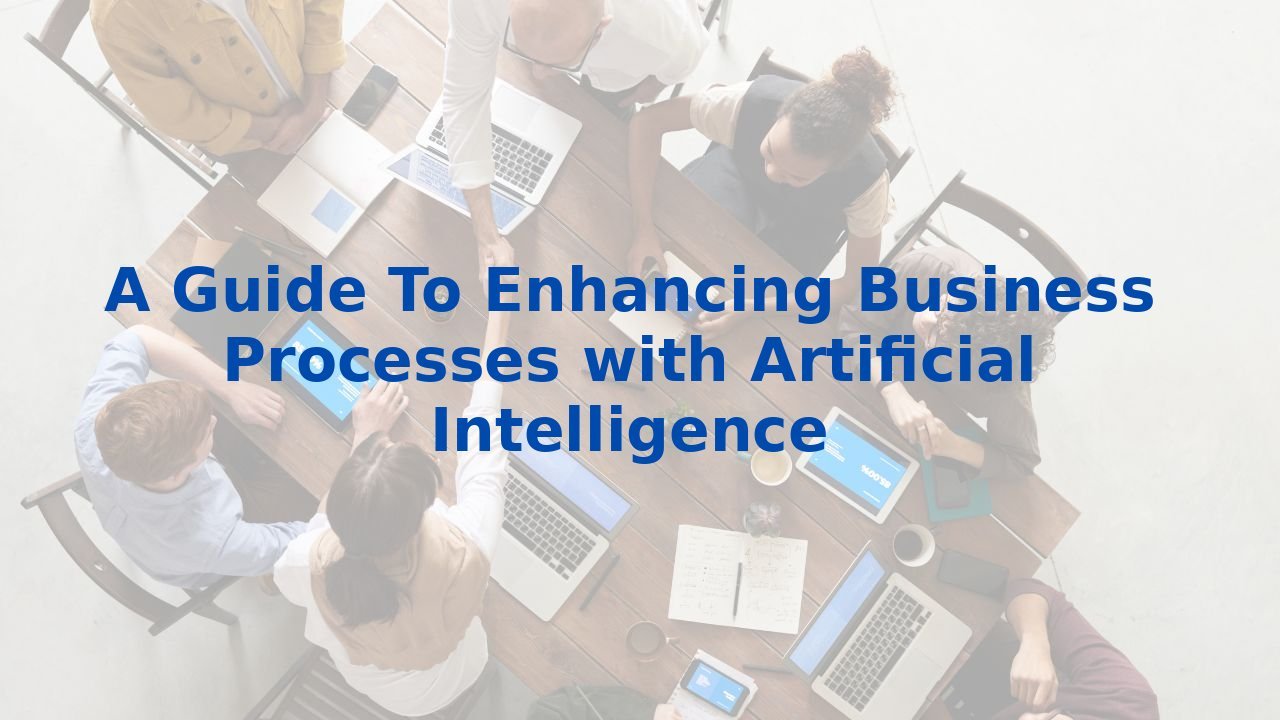A Guide To Enhancing Business Processes with Artificial Intelligence
A Guide To Enhancing Business Processes with Artificial Intelligence
In an era defined by rapid technological advancement, businesses are continually seeking effective methods to enhance their operational efficiency, reduce overhead costs, and improve decision-making. One of the most revolutionary developments in this pursuit is the integration of Artificial Intelligence (AI) into business processes. In this guide, we will explore how AI can transform general business processes and the profound benefits it can bring to organizational efficiency.
Understanding Business Process Management
Business Process Management (BPM) is a crucial methodology that has evolved since its inception in the late 1980s. It focuses on analyzing, optimizing, and automating various business processes to enhance efficiency, productivity, and overall quality. With AI's emergence, the dynamics of BPM are undergoing another transformation, allowing organizations to leverage data-driven insights more effectively than ever before.
How AI Enhances Business Processes
The power of AI lies in its ability to analyze vast datasets at unprecedented speeds, driving improvements across multiple facets of business processes. Below are several dominant ways AI enhances BPM:
Data Analysis and Visualization
AI excels in processing and analyzing enormous volumes of data quickly and efficiently, uncovering patterns, predicting trends, and diagnosing root causes. This capability allows businesses to make not only tactical but also strategic decisions with greater confidence. For instance, by employing AI to analyze disparate data sources, organizations can visualize process flows, pinpoint inefficiencies, and address potential issues proactively.
Process Building and Automation
AI can facilitate the creation of new processes and workflows tailored to specific organizational needs. Automation of previously manual tasks means that organizations save valuable time and labor, allowing employees to devote their focus to more strategic initiatives. For example, through AI, HR departments can automate processes such as salary negotiations, synthesizing data on performance, seniority, and market trends efficiently.
Predictive Analytics and Risk Management
By harnessing predictive analytics, AI enables organizations to analyze historical data on process flows and outcomes, allowing them to anticipate future challenges and bottlenecks. Imagine AI analyzing purchase data in real-time to identify unusual spikes in demand for certain products. Such insights empower businesses to develop agile responses to market dynamics, seeing them as opportunities rather than hurdles.
Real-Time Monitoring and Optimization
The advent of AI-driven process mining technology empowers companies to monitor their processes in real time. This up-to-the-minute analysis brings immediate insights into process statuses, allowing for timely interventions to rectify issues or capitalize on opportunities. Moreover, AI can simulate various scenarios, enabling businesses to analyze the potential impacts of changes before implementation.
Benefits of AI for Business Processes
Integrating AI into business processes unlocks numerous benefits:
- Improved Efficiency: By automating routine tasks, AI liberates employees to concentrate on higher-value activities, leading to heightened productivity and lowered operational costs.
- Enhanced Decision-Making: AI can provide actionable insights through predictive analysis, guiding decision-makers in their choices.
- Better Risk Management: AI's ability to detect anomalies allows businesses to mitigate risks swiftly, ensuring proactive, not reactive, problem-solving.
- Streamlined Processes: The automation of administrative tasks reduces error rates and enhances operational fluidity, driving overall effectiveness.
The Role of Employee Training in AI Integration
While AI presents remarkable potential for refining business processes, the human element remains critical. Training employees to make effective use of AI tools significantly augments the benefits realized from these technologies. Here are some compelling reasons to invest in employee training:
- Improved Adoption Rates: Comprehensive training helps employees understand and navigate AI tools, ensuring smoother adoption and better integration into existing workflows.
- Enhanced Decision-Making Skills: Equipping employees with insights into AI-driven decision-making processes enables them to leverage data insights more effectively.
- Increased Efficiency: As employees become adept at utilizing AI, their ability to automate tasks will deepen, dialing up organizational efficiency even more.
Conclusion
The synthesis of AI into business processes represents a transformational leap forward. This strategy not only amplifies efficiency and enhances decision-making but also reduces risks associated with operational setbacks. By operationalizing AI's potential for data analysis, process building, and real-time optimization, organizations can streamline their workflows and secure superior outcomes.
Moreover, training employees to harness these AI technologies effectively is paramount in maximizing the benefits. With an integrated approach that combines AI capabilities and a skilled workforce, companies stand poised to navigate today's dynamic business landscape and thrive in their endeavors.



